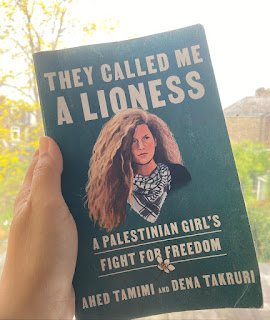Book Review: They Called Me a Lioness
“Keep a box of tissues handy."
How often have you seen this phrase in a book blurb?
Normally, it evokes images of a touching novel, filled with
moments designed to move me to tears. However, after reading They Called Me a
Lioness, my understanding of that advice has changed. Having finished the
book, I now realise there's a range to the suggestion of 'keeping tissues
handy'.
When I see this phrase associated with a book, I now wonder:
does it mean the book contains a few heartbreaking scenes, or is it the type
you can't read in public because you'll be crying throughout? Should we prepare
with a big box of tissues, or would a small one suffice?
Or perhaps, should we read it publicly, our tears a form of
shared resistance with our Palestinian brothers and sisters? As I write this,
my conscience echoes... resistance! Resistance is the student encampments at
universities, the relentless marches and protests through the streets of the
world, it's Ahed Tamimi’s refusal to surrender even after her harrowing
experiences with the Israeli injustice system.
They Called Me a Lioness is Ahed Tamimi’s firsthand account
of life under brutal military occupation, co-written by Dena Takruri, a
Palestinian-American journalist. You're likely familiar with Ahed Tamimi—if
you're active on social media, you've probably seen footage of her slapping a
soldier go viral. In the video, a 16-year-old Ahed punches and kicks a heavily
armed Israeli soldier to get them out of her front yard. Days later, she was
arrested and tried in a military court. The book delves deep into her arrest
and what she endured before and after the incident. We see how Israel
systematically oppresses an entire nation and flagrantly violates human rights.
For Ahed, living under occupation means frequently losing
her parents to arrests—one of her earliest memories is visiting her father in
prison—constantly preparing for a raid, and witnessing the brutal murders of
her extended family. Part history, part autobiography, we journey with Ahed
from her childhood to adulthood. We learn about the games she and her cousins
played; how her mother's arrest impacts the entire family; and her detailed
account of the harassment she faces when her video of punching and kicking the
soldier goes viral.
I can’t say I 'enjoyed' this book, per se, as the theme of
living under brutal occupation is hardly enjoyable. Yet, it was an informative
read, leaving me in awe of the courage and unbreakable spirit of Ahed, her
mother, her grandmother, Khalida Jarrar, and the other girls she met in prison.


Comments
Post a Comment